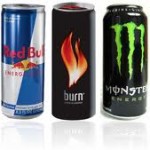Energy drinks can drastically increase blood pressure and disturb the heart’s natural rhythm, say researchers who presented their findings at the American Heart Association’s Epidemiology and  Prevention/Nutrition, Physical Activity and Metabolism 2013 Scientific Sessions.
Prevention/Nutrition, Physical Activity and Metabolism 2013 Scientific Sessions.
Energy drinks have very high levels of caffeine and taurine, both these ingredients can greatly elevate blood pressure and contribute to increased cardiovascular disease risk.
A previous study in 2007, presented at the American Heart Association’s Scientific Sessions, identified a similar link between energy drink consumption and increased risk of heart conditions.
The investigators measured the QT interval of 93 people after consuming one to three cans of energy drinks. Those who drank more energy drinks had a longer QT interval, for each can of energy drink the participants drank, their QT interval increased by 10 milliseconds.
The QT interval is a measure of the time in the heart’s electrical cycle, revealing the heart’s rhythm. A long QT interval is an indication of an irregular heartbeat. A prolonged QT interval is also associated with life-threatening arrhythmias.

Courtesy: American Heart Association
Ian Riddock, M.D., a co-author and director of preventive cardiology at the David Grant Medical Center, Travis Air Force Base, Calif, said: “QT prolongation is associated with life-threatening arrhythmias. The finding that energy drinks could prolong the QT, in light of the reports of sudden cardiac death, warrants further investigation.”
Among the 132 participants, their systolic blood pressure (top blood pressure reading) increased by an average of 3.5 points. Since energy drinks also contain caffeine, people who do not normally drink much caffeine might have an exaggerated increase in blood pressure.”
The patients who are older or have pre-existing health concerns are more likely to experience health-related side effects from energy drinks.
According to a study carried out in 2011 and published in Pediatrics, children are at a particularly high risk of cardiac abnormalities due to energy drink consumption.
